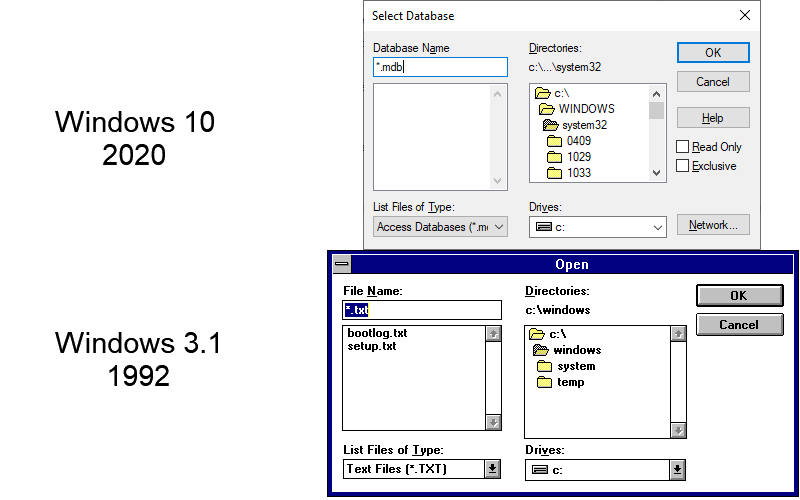That’s an interesting comment from a guy that used to work for Canonical, and then went anti-snap pretty hard, to the point that he made this:
- 2 Posts
- 72 Comments

 4·27 days ago
4·27 days agoThanks for the list. It’d be interesting to see something like the Are We X Yet sites for Mozilla/Rust projects that tracks this sort of thing
I couldn’t view this with Firefox or Gnome. ImageMagick to the rescue, though:
convert https://pub-be81109990da4727bc7cd35aa531e6b2.r2.dev/weofihweiof.jpg meme.jpg

You might also be interested in checking out Zellij, it’s like tmux with nice defaults

 77·6 months ago
77·6 months agoThere’s some even older UI bits buried around in there:


 15·8 months ago
15·8 months agoI know it won’t happen, but it’d be nice if Linux switched to GPLv3. That would at least help somewhat here
VLC is the sort of software where if it can’t play it, I don’t know what else could. I guess I’d also try the ffmpeg command line tool to see if it can figure out what the video file even is, and maybe it could convert it to a regular format.
Also TBH such a video file would be interesting enough that you could probably post it here (if possible, or any metadata you can extract from it) and see if anyone knows how to play it.
Since Word documents are one of your bigger concerns, you can download LibreOffice on one of your current machines and try them out. That’s the same program you’d be using on Linux.
It’d have to be a pretty unusual video format to have issues. Similar to above, you can try VLC on Windows and see if there’s any issues.
Based on your description, I’d be surprised if you encountered any major issues. I’d recommend trying either Pop! OS if you’re OK with a slightly different UI from Windows, or Mint if you want something more comfortable. Note that you can create a LiveUSB stick of either of those, or any other distro. You can then boot your computer from it and take it for a spin to see if there’s any obvious issues.

 34·8 months ago
34·8 months agoOh neat. Development had died down, but looks like it’s picking back up again and the creator is finding more maintainers. It’s what I use on my phone.
Documentation is sorely lacking in many different open source projects. Often just making sure the documentation is up-to-date is very helpful

 7·8 months ago
7·8 months agoKind of looks like an alternative universe where Rust really leaned into its initial Ruby influences. IMO the most interesting thing was kicked down the road, I’d like to see more of the plan for concurrency. Go’s concurrency (which it says they’re thinking of) kind of sucks for lots of things, like “do these tasks in parallel and give me the return values”. Go can do it with channels and all that, but Rayon’s
par_iter()just magically makes it all work nicely.

 1·8 months ago
1·8 months agoYou should believe it as much as you want. I don’t have any inside knowledge myself, I just remembered an HN comment that was relevant to this post and linked it.
Linus wrote git before anything like github existed, and the best way to do it was email. They just haven’t switched away from using email
Stable as in the UI doesn’t get changed often, or stable as in unlikely to crash?

 132·8 months ago
132·8 months agoApparently there’s an effort underway. I don’t have any more context than this:
https://news.ycombinator.com/item?id=38020117
I will say that I actually like the flat namespace, but don’t have a strong opinion
Dunno what permissions issues you’re hitting, but I organize everything with beets on my desktop and then sync everything using syncthing to the main Music folder on my phone and it all works nicely. I use an old app that I think isn’t even available on the app store anymore named MortPlayer that uses the synced folder structure to organize things.
I don’t use m3u files, but I imagine you could just sync them to the main Music directory next to the music files and have it work out, I guess depending on which app you use

 31·8 months ago
31·8 months agoCan’t promise anything, but a few years has made a pretty huge difference here. If the game you want to play is on Steam and doesn’t have weird anticheat, it’ll likely just work. If it’s not on Steam, try Lutris.
If the game you want to play still doesn’t work, post here and say “LINUX BLOWS BECAUSE IT CAN’T PLAY THIS GAME” and then you’ll get a dozen different ways to make it run

 2·9 months ago
2·9 months agoCan you boot into an old generation and see if that fixes the issue? If it doesn’t maybe check if you’ve updated firmware recently
I’m too lazy to convert that by hand, but here’s what chatgpt converted that to for SQL, for the sake of discussion:
SELECT a.id, a.artist_name -- or whatever the name column is in the 'artists' table FROM artists a JOIN albums al ON a.id = al.artist_id JOIN nominations n ON al.id = n.album_id -- assuming nominations are for albums WHERE al.release_date BETWEEN '1990-01-01' AND '1999-12-31' AND n.award = 'MTV' -- assuming there's a column that specifies the award name AND n.won = FALSE GROUP BY a.id, a.artist_name -- or whatever the name column is in the 'artists' table ORDER BY COUNT(DISTINCT n.id) DESC, a.artist_name -- ordering by the number of nominations, then by artist name LIMIT 10;I like Django’s ORM just fine, but that SQL isn’t too bad (it’s also slightly different than your version though, but works fine as an example). I also like PyPika sometimes for building queries when I’m not using Django or SQLAlchemy, and here’s that version:
q = ( Query .from_(artists) .join(albums).on(artists.id == albums.artist_id) .join(nominations).on(albums.id == nominations.album_id) .select(artists.id, artists.artist_name) # assuming the column is named artist_name .where(albums.release_date.between('1990-01-01', '1999-12-31')) .where(nominations.award == 'MTV') .where(nominations.won == False) .groupby(artists.id, artists.artist_name) .orderby(fn.Count(nominations.id).desc(), artists.artist_name) .limit(10) )I think PyPika answers your concerns about
What if one method wants the result of that but only wants the artists’ names, but another one wanted additional or other fields?
It’s just regular Python code, same as the Django ORM.





They won’t open source snaps because they want to control the snap ecosystem to make money off of it for an IPO